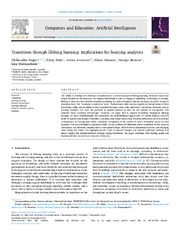Please use this identifier to cite or link to this item:
https://rfos.fon.bg.ac.rs/handle/123456789/2236Full metadata record
| DC Field | Value | Language |
|---|---|---|
| dc.creator | Poquet, Oleksandra | |
| dc.creator | Kitto, K. | |
| dc.creator | Jovanović, Jelena | |
| dc.creator | Dawson, Shane | |
| dc.creator | Siemens, George | |
| dc.creator | Markauskaite, L. | |
| dc.date.accessioned | 2023-05-12T11:37:25Z | - |
| dc.date.available | 2023-05-12T11:37:25Z | - |
| dc.date.issued | 2021 | |
| dc.identifier.issn | 2666-920X | |
| dc.identifier.uri | https://rfos.fon.bg.ac.rs/handle/123456789/2236 | - |
| dc.description.abstract | The ability to develop new skills and competencies is a central concept of lifelong learning. Research to date has largely focused on the processes and support individuals require to engage in upskilling, re-learning or training. However, there has been limited attention examining the types of support that are necessary to assist a learner's transition from “old” workplace contexts to “new”. Professionals often undergo significant restructuring of their knowledge, skills, and identities as they transition between career roles, industries, and sectors. Domains such as learning analytics (LA) have the potential to support learners as they use the analysis of fine-grained data collected from education technologies. However, we argue that to support transitions throughout lifelong learning, LA needs fundamentally new analytical and methodological approaches. To enable insights, research needs to capture and explain variability, dynamics, and causal interactions between different levels of individual development, at varying time scales. Scholarly conceptions of the context in which transitions occur are also required. Our interdisciplinary argument builds on the synthesis of literature about transitions in the range of disciplinary and thematic domains such as conceptual change, shifts between educational systems, and changing roles during life course. We highlight specific areas in research designs and current analytical methods that hinder insight into transformational changes during transitions. The paper concludes with starting points and frameworks that can advance research in this area. | en |
| dc.publisher | Elsevier B.V. | |
| dc.rights | openAccess | |
| dc.rights.uri | https://creativecommons.org/licenses/by-nc-nd/4.0/ | |
| dc.source | Computers and Education: Artificial Intelligence | |
| dc.subject | Transitions | en |
| dc.subject | Lifelong learning | en |
| dc.subject | Learning analytics | en |
| dc.subject | Human development | en |
| dc.subject | Complex dynamic systems | en |
| dc.subject | Causality | en |
| dc.title | Transitions through lifelong learning: Implications for learning analytics | en |
| dc.type | article | |
| dc.rights.license | BY-NC-ND | |
| dc.citation.other | 2: - | |
| dc.citation.volume | 2 | |
| dc.identifier.doi | 10.1016/j.caeai.2021.100039 | |
| dc.identifier.fulltext | http://prototype2.rcub.bg.ac.rs/bitstream/id/792/2232.pdf | |
| dc.identifier.rcub | conv_3703 | |
| dc.identifier.scopus | 2-s2.0-85124037624 | |
| dc.type.version | publishedVersion | |
| item.cerifentitytype | Publications | - |
| item.fulltext | With Fulltext | - |
| item.grantfulltext | open | - |
| item.openairecristype | http://purl.org/coar/resource_type/c_18cf | - |
| item.openairetype | article | - |
| Appears in Collections: | Radovi istraživača / Researchers’ publications | |
SCOPUSTM
Citations
23
checked on Nov 17, 2025
Page view(s)
8
checked on Dec 28, 2025
Download(s)
4
checked on Dec 28, 2025
Google ScholarTM
Check
Altmetric
This item is licensed under a Creative Commons License


